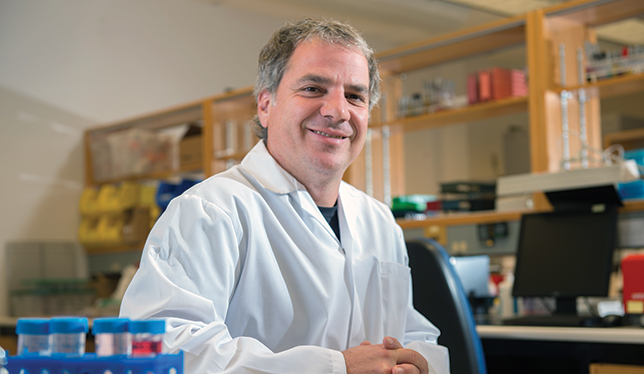
Gary Kobinger, internationally renowned for his work to develop a treatment for Ebola, is leaving the Public Health Agency of Canada’s National Microbiology Laboratory in Winnipeg to return to his hometown of Quebec City. In July be becomes the new director of the Centre de recherche en infectiologie, or CRI, at Université Laval. “It isn’t easy to leave” the national laboratory, admitted the microbiologist. “For eleven years, I got to realize one of my dreams by working in a level four containment laboratory, where I was authorized to handle the world’s most pathogenic micro-organisms.”
During his time in Winnipeg, he made a significant contribution to the development of ZMapp, the experimental Ebola treatment. He also designed the first vaccine that proved effective against the disease, just as West Africa was experiencing its most severe outbreak. As well, the mobile laboratories his team developed greatly simplified and accelerated diagnostic testing, a crucial tool in combating Ebola.
These successes earned him the honour of being named Radio-Canada’s Scientist of the Year. “Science isn’t about winning awards, but I am touched that it is awarded by the media,” said Dr. Kobinger. “What that says to me is that our work resonated with the public. We use public funds, and citizens need to understand what we do so they can appreciate the impact of our work.”
Despite his successes in Winnipeg, Dr. Kobinger said it was time to return home. “I think Quebec City, where I grew up, is the most beautiful city in the world,” said the researcher. “Plus, I want to give back to the community that supported me during my childhood.”
At the Public Health Agency of Canada, Dr. Kobinger focused on public health issues rather than clinical trials. At Université Laval, his goal will be to develop a structure that can respond even more quickly to emerging and re-emerging pathogens.
Dr. Kobinger believes it is important to decrease the response time between detection in clinical trials and Phase 1, the stage at which vaccines and treatments are administered. He also wants to set up a biobank at CRI, where pathogens and vaccine lots will be stored in conditions that ensure sufficient quality for use in clinical trials.
He is also proud to say that CRI is participating in the first human clinical study for a Middle East Respiratory Syndrome (MERS) vaccine. CRI is also awaiting Health Canada approval to launch a clinical study for a Zika virus vaccine.
One thing is certain: Université Laval will be delighted to welcome Dr. Kobinger. “He has a great track record as both a researcher and administrator, and that is essential for a research centre director,” said Edwin Bourget, vice rector for research and innovation. “He also brings extensive expertise in creating platforms for vaccine development.”
Congratulations Dr. Kobinger !!! The scientist of the year award was certainly well deserved. So many real heroes are never recognized by the public. I hope the folks in Geneva start paying attention to what you and the rest of the people developing these vaccines are doing.
Dr. Gary Kobinger,
We are pleased to invite you to the “International Conference on Vaccine Adjuvants & Delivery Technologies” scheduled from October 30-31, 2017, at Chicago, USA. This Conference will be hosted and supported by Allied Academies.
The Conference deliberations will be on the following theme: Discussion on latest research and technologies in Vaccine adjuvants & delivery systems. For more details please have a glance here on our conference webpage: http://vaccinedelivery.alliedacademies.com/
With reference to your expertise in the field, we would like to invite you for the scientific collaboration with Vaccine Delivery 2017 event, and honor you as a Keynote Speaker.
We look forward to your presence and guidance.
Regards
Nancy Gomez
Program manager
Vaccines Delivery-2017
T- +1- 201-877-9344
[email protected]